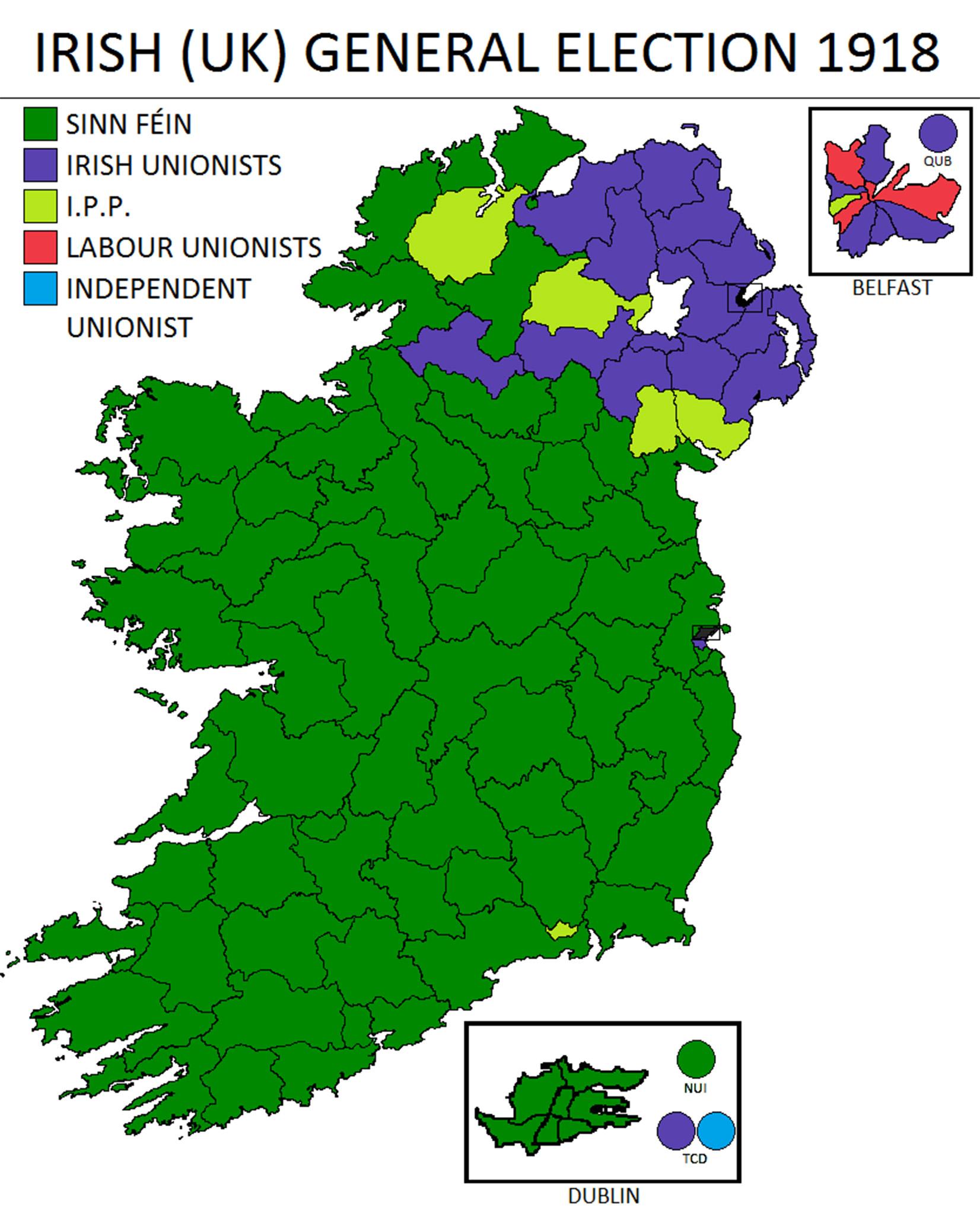100 years since the last all-Ireland election, the island’s future is being decided again
In December 1918, Ireland delivered a resounding cry for independence, before being unjustly partitioned. A century later, the British are seeing their political goals thwarted by a border of their own design

100 years ago today, on 14 December 1918, Ireland voted in a general election which marked a crossroads in the nation’s history. The last election at which all of Ireland was part of the UK, it would also prove to be the last one held across the entire island.
Coming just weeks after the end of the First World War, it was the first time people had been given a change to vote since 1910, and for the first time, the franchise was extended to all men over 21 and some women.
At a time when Europe was experiencing fundamental change, with borders being redrawn around the world, Ireland seized an historic chance. Though this was technically a Westminster election, the vote became a proxy referendum on Irish independence.
Sinn Féin, then a relatively new party led by Éamon de Valera, stood on a platform of abstaining from Westminster, promising instead to set up an Irish parliament. They won a landslide victory, taking 73 of the country’s 105 seats. Ireland had delivered a resounding cry for independence.
While their mandate covered most of the island, unionist candidates triumphed in the north. They demanded to remain within the UK, and threatened armed resistance to any rule from Dublin.

Ireland’s democratic choice was ignored by London, and instead Sinn Féin set up an alternative parliament in Dublin, the first Dáil Éireann. A brutal war ensued, which ended when Britain offered Ireland independence - but only for 26 of 32 counties. To placate unionists, a border was drawn, and Northern Ireland was created.
100 years on, it is fascinating to contrast current events with 1918, and note some remarkable parallels.
In 1918, Britain sought to deny Ireland’s quest for independence, and when it was granted, they oversaw an unjust partition which went on to cause decades of conflict.
Now in 2018, as Britain seeks ‘independence’ from the EU, it is once again attempting to play fast and loose with the island of Ireland, having learned nothing from hindsight, and caring little for consequence. The difference today is that the tables have turned.
In Brexit, Ireland now has the upper hand, and the anger this has sparked in many British Conservatives betrays an outdated, imperialist mindset.
Priti Patel suggested food shortages in Ireland should be used as leverage in negotiations, and speaking to BBC’s Newsnight this week, one Tory grandee said, “We simply cannot allow the Irish to treat us like this...The Irish really should know their place.”
In fact, the Irish do know their place, and it is at the heart of Europe. Now a strong, modern democracy, strengthened by EU membership, Ireland is ably standing up to Britain. But this is not the empire striking back in petty revenge, Ireland is merely protecting its own interests.
The economic and political harmonisation which came from the softening of the border in Ireland has directly correlated with the success of our peace process. A hard border would threaten this, and move us in the wrong direction. This is why the backstop is an essential part of any deal negotiated between the UK and the EU.
If this frustrates Brexiteers, they have only themselves and their Conservative ancestors to blame. By drawing a border across Ireland a century ago, Britain made a grave error, and ignoring it during the EU debate was a foolish mistake, for now it is thwarting their plans.
As we leave the EU, the hard Brexiteers (and Labour for that matter) must accept that Northern Ireland needs to be treated differently from the rest of the UK, in line with Theresa May’s deal.
After all, when ‘Ulster said no’ to Irish independence in 1918, it was afforded special status. Why can the same not be so, now that Northern Ireland has overwhelming said no to Brexit?
The elephant in the room is of course Irish unity. It may have been a long time coming, but it is now fast becoming a reality.
It is clear that the people of Ireland, north and south, see their future in Europe, and by dragging Northern Ireland out against its will, causing economic damage in the process, Conservatives and the DUP have begun the destruction of their precious union.
Ironically, while Irish republicans have carried the baton along most of the road to reunification, it seems Britain may just carry it across the final stretch of the relay themselves.
The election of 1918 sparked a period which led to Ireland’s unjust division. Now, in 2018, we are on the cusp of a period which could see the island brought back together. And with its short-sighted, careless behaviour, we can thank Britain for both.
Join our commenting forum
Join thought-provoking conversations, follow other Independent readers and see their replies
Comments
Bookmark popover
Removed from bookmarks